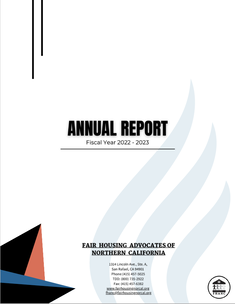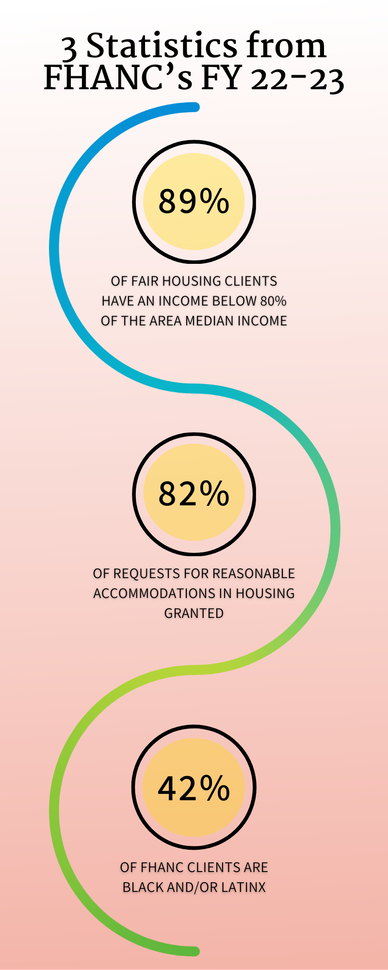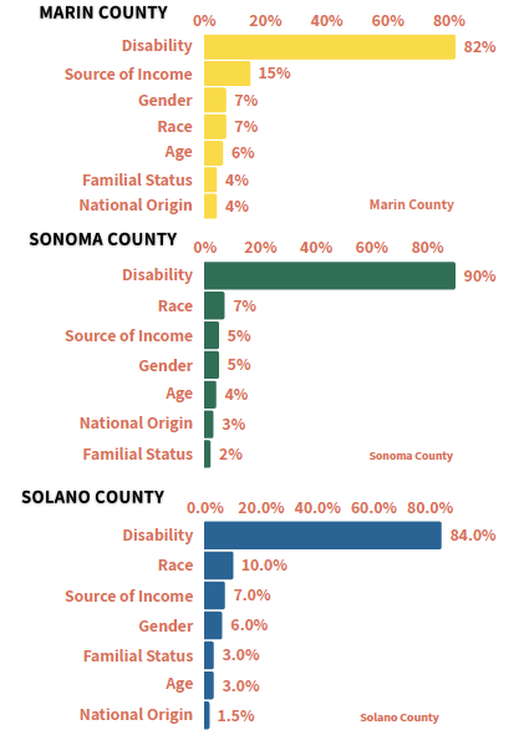FHANC offers fair housing counseling services to homeowners and renters located in the counties of Marin, Solano, and Sonoma (with the exception of the city of Petaluma), who have experienced discrimination based on their membership in a protected class. We also offer Foreclosure Prevention and Pre-Purchase Education/Counseling services to homeowners in the Bay Area.
FHANC Statistics: Fiscal Year 2022-2023
|
Between July 1, 2022 and June 30, 2023, FHANC provided counseling or education to 5036 tenants, homeowners, homebuyers, housing providers, children, social service providers, and advocates across Marin, Sonoma, and Solano counties and beyond.
Of the clients who received counseling services, 90% are extremely low-, very low-, or low-income. In addition, 21% are Latinx (16% of whom speak primarily Spanish), and 21% are Black/African-American. FHANC transitioned to remote work in March 2020 and continues to serve clients virtually. Fair Housing Advocates of Northern California remains open and connected to the community to provide referrals, resources, and advocacy for those who have been impacted by the pandemic. |
By The Numbers
1850 clients received counseling related to housing discrimination, foreclosure prevention, or first-time home buying
447 clients alleged housing discrimination and received fair housing advice, counseling, and/or legal representation
160 homeowners in mortgage distress received foreclosure prevention counseling
61 clients assisted in successfully accessing accommodations or modifications from landlords in order to accommodate their disabilities or remain housed
13 fair housing lawsuits and/or administrative complaints filed by FHANC to address housing discrimination
$490,050 monetary awards or attorneys fees collected on behalf of clients or FHANC to compensate for discriminatory acts committed by housing providers
3186 housing providers, advocates, government staff, service providers, and community members trained through fair housing, pre- purchase, and foreclosure prevention workshops/ presentations
347 community members attended FHANC's fair housing conference and/or FHANC's conference on successfully housing people with disabilities
8,810 flyers, brochures, and literature distributed regarding housing discrimination, foreclosure prevention, and/or first-time home buying
180 prospective homebuyers trained in pre- purchase education
131 clients or community members received counseling or education services in Spanish
137 landlords and realtors received fair housing law and practice training in order to prevent housing discrimination
447 clients alleged housing discrimination and received fair housing advice, counseling, and/or legal representation
160 homeowners in mortgage distress received foreclosure prevention counseling
61 clients assisted in successfully accessing accommodations or modifications from landlords in order to accommodate their disabilities or remain housed
13 fair housing lawsuits and/or administrative complaints filed by FHANC to address housing discrimination
$490,050 monetary awards or attorneys fees collected on behalf of clients or FHANC to compensate for discriminatory acts committed by housing providers
3186 housing providers, advocates, government staff, service providers, and community members trained through fair housing, pre- purchase, and foreclosure prevention workshops/ presentations
347 community members attended FHANC's fair housing conference and/or FHANC's conference on successfully housing people with disabilities
8,810 flyers, brochures, and literature distributed regarding housing discrimination, foreclosure prevention, and/or first-time home buying
180 prospective homebuyers trained in pre- purchase education
131 clients or community members received counseling or education services in Spanish
137 landlords and realtors received fair housing law and practice training in order to prevent housing discrimination
Percentages of Types of Complaints for Previous Three Fiscal Years
Federal Protections
359 complaints related to disability
52 complaints of race discrimination
29 complaints of gender discrimination
15 complaints of national origin discrimination
13 complaints of familial status discrimination
4 complaints of religious discrimination
2 complaints of color discrimination
State Protections
46 complaints of source of income discrimination
19 complaints of age discrimination
6 complaints of sexual orientation discrimination
1 complaint of immigration status discrimination
Please note that some complaints alleged discrimination on the basis of multiple protected classes.
359 complaints related to disability
52 complaints of race discrimination
29 complaints of gender discrimination
15 complaints of national origin discrimination
13 complaints of familial status discrimination
4 complaints of religious discrimination
2 complaints of color discrimination
State Protections
46 complaints of source of income discrimination
19 complaints of age discrimination
6 complaints of sexual orientation discrimination
1 complaint of immigration status discrimination
Please note that some complaints alleged discrimination on the basis of multiple protected classes.
FHANC Success Stories & Testimonials
|
On August 30, 2022, FHANC received a call from a stressed senior in Novato, California. Her husband had passed away during COVID, leaving her grieving and trying to live on only one income. FHANC’s client also provides emotional and housing support for her 90-year-old mother. It quickly became apparent that her financial problems extended well beyond her mortgage, which was $64,000 delinquent when she called. FHANC’s counselor immediately provided resources for assistance with Pacific Gas & Electric Company (PG&E) and other outstanding bills. Since the client’s housing ratio indicated a need for a modification, a Request for Mortgage Assistance was submitted to her lender. The process became bogged down with issues surrounding her mother’s finances. It became apparent that answers they had submitted without FHANC’s assistance on the Request for Mortgage Assistance form were triggering confusion. The mother had been mistakenly listed as a co borrower. The FHANC counselor began interacting with the lender exclusively so as to avoid future confusion. The delinquency was approaching the highest level permitted by the California Mortgage Relief program. The client’s daughter assisted her mother throughout the process. Given the financial disarray since her dad’s passing, she and her sisters increased their support during this process and the client’s emotional state visibly improved. On November 21, 2022, FHANC’s client received notice that she had been funded by the CMRP and her next payment was not due until January 1, 2023. The FHANC counselor continues to send the household information on resources and new programs that might be of benefit to help with affordability and long-term stability. |
On March 20, 2023, FHANC received a call from a single mom with a sale notice in hand. She had recently divorced and moved her family in with her father, who had been diagnosed with dementia and needed assistance. She did not realize that his mental condition had led to the imminent loss of his home until she received the notice of an auction scheduled for April 12. FHANC responded quickly, performing an intake to determine options and collecting documents for an application to the California Mortgage Relief Program (CMRP) application in less than a week. The day after submission, the CMRP contacted the client’s lender, and the auction was postponed. However, we encountered requests for additional income documents that the client did not know existed. These too were quickly located and submitted. By April 20, her father’s application was approved, and the risk of foreclosure ended. She will help him manage payments moving forward. On March 30, 2023, FHANC received a call from a distressed homeowner in Santa Rosa. She is a hard-working senior with full custody of her two teenage grandchildren. Although she had been able to remain current with her mortgage, raising two granddaughters and COVID cutbacks had stressed her finances to the point that she failed to pay her property taxes for several years and breached payment agreements with the County Assessor. The assessor gave her three months to cure the entire debt or see her home auctioned. FHANC moved quickly and submitted a CMRP application for the client, working through many complications that created delays. At the end of June, the County Assessor finally reported the client had been fully funded by the CMRP and was no longer in danger of receiving a sale notice. |






